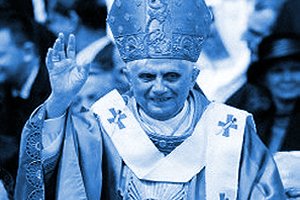

What Sort of Man is This?
by Roger A. McCaffrey

I am in Rome this week conducting some extremely important research that, very frankly, requires both perspicacity and determination. I refer of course to wine and restaurant research. It gets difficult to form sound judgements after three or four days. But you push on, switching from excellent reds to excellent whites just for the heck of it, and from fresh pasta to crepes to zuppa.
One favorite cuisinal establishment in the Vatican area is Armando's, on Via Plauto. I know the food is good because all manner of Roman curial officials inhabit the place. I am a regular myself, although Cardinal Ratzinger—remember him?—didn't even recognize me the two times he strolled in for lunch in 2002 and 2003.
When Benedict came in, I might add, the proprietor, Armando, instantly switched the music from Italian pop to classical. (Didn't Adolf Hitler also enjoy classical music? German...classical music...disciplined—you see the connection?)
In any case, a few thoughts on his election, in no particular order.
1. Wilton Wynn, unofficial dean of the college of correspondents, the retired Time magazine man, has now had two weeks to reflect on what we agreed was the shock of Benedict's election. Pausing from a difficult (because huge) plate of risotto, I suggested that this spells the end, for the forseeable future, of the Italian lock on the papacy. Wojtyla could always be seen as a fluke election. But now we've had two of those. Wynn agreed and raised me one. Tettamanzi, the clear favorite going into the conclave, "was too Italian." The cardinals look for multi-lingualists now with important resumes, and what was once the Italians' greatest strength—total familiarity with the Vatican and intimacy with Rome's insiders—has become a potential drawback. Therefore, no more Lucianis (John Paul I, who rarely left Northern Italy).
2. Benedict XVI is putting his own reserved stamp on the papacy in record time. I hate to disappoint you, but public Masses with greetings of the flock in 21 languages may not be that common. Tight pronoucements in Latin (when speaking to churchmen) or just in Italian (when speaking to the faithful) will be the norm, or so it seems. Another example of the change in style: Ascension Thursday, which in America as you well know is a holy day of obligation when it falls on a Thursday after a Tuesday when there is not a bishops' meeting, is not a holy day in Italy but you could normally catch a glimpse of John Paul II. This year it is apparently coming and going without Benedict saying public Mass. More significantly, the new pontiff's private daily Masses have not, so far, been open to 20 or 30 invited guests, which was John Paul II practice for over 27 years. It was rare before his time. The guessing is that Benedict will make it rare again.
How many people per day can the Holy Father possibly be delighted to meet, especially when he was in the Hitler Youth, is highly disciplined, and only likes classical music?
3. The election of Benedict confounded all observers. It's true that we began to hear his name in the weeks after John Paul began to fade, but no expert I have read thought that he had a realistic chance until just before the conclave itself. Then, some dutifully reported that Vatican insiders had begun to mention him as having a solid bloc of votes to start the conclave. That we all knew. But his very outspokenness and superb sermons and addresses (there were four in the late winter and spring, by my count) were thought to present an additional impediment to his election. How, experts reasoned, could he be a consensus pick, or if you wish a compromise candidate, when he refused to play that role—indeed forthrightly rejected it with his tough sermons and very public assertion of superiority. How, I reasoned, could this clearly superior man be elected by a group that has not exactly distinguished itself with courage or clarity of thought except on infanticide? (Yes, they're hard as rock on the tricky infanticide issue.)
4. John Allen of the National Catholic Reporter, who has cashed in enviably on the conclave and is the English world's reigning expert on papal elections and on Ratzinger himself, had in recent years dismissed the old left-right categories for analyzing the college of cardinals. Yet two of Allen's four new categories were, well, center-right political categories by another name. And Benedict fell into both of those camps. Allen and the rest of us thought each group of cardinals was pretty equal in strength. The point is that by any analysis that I have heard, there was something extra at work in this conclave. And I would contend that the Holy Spirit's influence was evident, all the more so with the emphatic nature of the election of the most emphatic man in recent memory to occupy the Chair of Peter.
5. No Catholic is bound to believe that the Holy Spirit's choice is always elected. We're bound to believe in papal primacy and infallibility, whoever is elected. But I think Joseph Ratzinger will prove a Godsend for traditionalists who have read his almost-adamant endorsements of the 1962 missal as a legitimate and desireable option for Mass. Just as importantly for the Church, he will prove to be a reformer of the new rite—for years he has called for such reform. Be prepared to rally around him.

